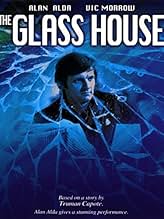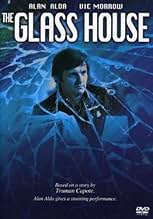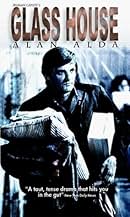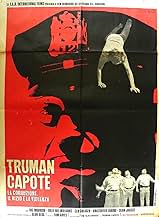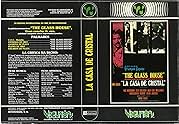IMDb RATING
7.1/10
990
YOUR RATING
Corrections officer Brian Courtland, naive drug pusher Alan Campbell, and college professor Jonathan Page convicted of manslaughter report to prison and soon learn the truth about the prison... Read allCorrections officer Brian Courtland, naive drug pusher Alan Campbell, and college professor Jonathan Page convicted of manslaughter report to prison and soon learn the truth about the prison system. From a Truman Capote story.Corrections officer Brian Courtland, naive drug pusher Alan Campbell, and college professor Jonathan Page convicted of manslaughter report to prison and soon learn the truth about the prison system. From a Truman Capote story.
- Director
- Writers
- Stars
- Won 1 Primetime Emmy
- 2 wins & 4 nominations total
Edward Michael Bell
- Sinclair
- (as Edward Bell)
- Director
- Writers
- All cast & crew
- Production, box office & more at IMDbPro
Featured reviews
Anybody visiting this for the first time now who can't take themselves back to 1972 (the time of the film's release) are going to be screaming formulaic. Luckily as a fan of the genre and holding a steadfast belief that a viewer should always get a mindset of a film's original release period, I wouldn't dream of calling this formulaic.
This is something of genre perfection because the makers realise that incarceration should be stifling, the viewer should feel a level of oppression to get on side with the nature of the film, and here they achieve that with a feeling of simmering menace bubbling under the surface, you know that things are going to go pear shaped and it's the waiting that drives you on in an uneasy state.
All the pieces are in place for classic prison drama, tough nasty bad guy exuding menace (a wonderful creeper turn from Vic Morrow), the screw who is the lone voice of authority who cares (take a bow Clu Gulager), the good guy main protagonist who we are rooting for (a fine heartfelt turn from Alan Alda), and a story that doesn't veer to nonsense (from the pen of one Truman Capote).
The violence is shocking, and of course rape and suicide is prominent, all the things to make the viewer stunned and saddened in equal measure are here, but most of all the film triumphs with its ending, there is no cop out here and the makers were brave enough to not slip into maudlin pay off that so many prison genre films tend to do.
For this new modern era of film making there is nothing new here, but for 1972 and a TV movie, this is well worth support and sampling by any potential first time viewers. 8/10
This is something of genre perfection because the makers realise that incarceration should be stifling, the viewer should feel a level of oppression to get on side with the nature of the film, and here they achieve that with a feeling of simmering menace bubbling under the surface, you know that things are going to go pear shaped and it's the waiting that drives you on in an uneasy state.
All the pieces are in place for classic prison drama, tough nasty bad guy exuding menace (a wonderful creeper turn from Vic Morrow), the screw who is the lone voice of authority who cares (take a bow Clu Gulager), the good guy main protagonist who we are rooting for (a fine heartfelt turn from Alan Alda), and a story that doesn't veer to nonsense (from the pen of one Truman Capote).
The violence is shocking, and of course rape and suicide is prominent, all the things to make the viewer stunned and saddened in equal measure are here, but most of all the film triumphs with its ending, there is no cop out here and the makers were brave enough to not slip into maudlin pay off that so many prison genre films tend to do.
For this new modern era of film making there is nothing new here, but for 1972 and a TV movie, this is well worth support and sampling by any potential first time viewers. 8/10
The Glass House is as interesting and fascinating as it is gruesome and horrifying. After seeing all the accounts of corruption and violence, we have every reason to believe it when the opening credits say "The story and characters are ficticious (sic),
but the situations are real." It's also kind of ironic and comical that whoever wrote that sentence needs a course in spelling. This movie, as I understand, was filmed entirely on location in Utah State Prison. Many, if not all, of the extras are real inmates, which adds to the authenticity of the film.
The movie begins a with handful of convicts, including a college professor named Jonathon Paige (Alan Alda); a naïve, young drug pusher, Alan Campbell (Kristoffer Tabori), and an idealistic corrections officer named Brian Courtland (Clu Gulager) all starting their first day in prison. The new fish are introduced to the brutal, vicious crime boss Hugo Slocum, played brilliantly by the classic villain character actor Vic Morrow. We know he means business right from the get-go ("...when I offer you somethin' for free, you take it!").
Paige is assigned to work in the prison pharmacy, where he refuses to supply one of Slocum's men, Ajax (Scott Hylands), with drugs. Big mistake. Now he's really put a bullseye on his back. "Too bad," says the other inmate in the pharmacy, whom we only know as Lennox (Billy Dee Williams), "you could've done easy time." Amen. We learn there is sometimes a fine line between morals and sensibility.
The story reveals more violence, corruption, and tragedy: there's a scalding, knifing, gang rape, and an accidental shooting. At first, Officer Courtland, being a man of principle, is excited and anxious to work in the prison system, because he wants to make a difference. The guards, however, seem to be content to look the other way, and the Warden seems oblivious, too. As Courtland sees the unraveling of violence among the inmates, along with corruption and indifference among the staff, he begins to question the integrity of the system. Just as Lennox bluntly states, "Cons, guards, can't tell the difference after a while." We see that this is shockingly true.
Courtland tries to warn the cold Warden (Dean Jagger) that a killing is inevitable, but the Warden shrugs it off by saying "Sometimes it's just better to let certain given situations adjust themselves" (translation: I don't care if the inmates kill each other). Meanwhile, another one of Slocum's gang, who knows he's going to be slain shortly, gives a handwritten notebook, with records of the guards Slocum bribed, to Paige. They both know that if the book can somehow get to the right people on the outside, the violence and corruption can be exposed. However, the situation is about to boil over, and Paige knows time is closing in on him.
The characters are all very well-written and well-played by the actors. Alan Alda is convincing as the sincere and confused professor who is trying to keep everyone off his back, do his time and get out. Vic Morrow is magnificent as the tough, brutal, ruthless gang boss who wants it his way or no way at all, and will kill anyone who challenges him. Clu Gulager is equally resounding as the heroic, wholesome prison guard who is a little wet behind the ears. Kristoffer Tabori gives a good performance as the little lost puppy with his tail between his legs. We know he's going be attacked sooner or later, and he plays fear and realization best with the horror in his eyes and his facial expressions. Billy Dee Williams's character, Lennox, the inmate who is morally correct, yet tough and smart enough to know the art of prison survival, was one of the most interesting in the film, but could've benefitted from more screen time. We really believe his sincerity when he says, "I want these men to realize their value as individuals and as human beings." I would've like to have known a little more about him, and what made him tick.
The Glass House raises a lot of interesting and provocative questions about society in general and the prison system specifically. "I'm not in love with this system, but it's all we've got, and it's better than having no system at all" says the Warden, stone-faced. Is it true? Or is the system whatever we make it to be? Is prison always the answer for convicted criminals? Are there some inmates who are just bad apples that can't be rehabilitated? Are the prison personnel with morals and principles always going to be vastly outnumbered by the indifferent and corrupt? Are inmates nothing more to the penal system than garbage to be dumped in the prisons? Should prison be the living hell for convicts that the movie makes it out to be? Does prison really reform criminals? Can any positive changes be made to the penal system? Does anybody really care?
The movie begins a with handful of convicts, including a college professor named Jonathon Paige (Alan Alda); a naïve, young drug pusher, Alan Campbell (Kristoffer Tabori), and an idealistic corrections officer named Brian Courtland (Clu Gulager) all starting their first day in prison. The new fish are introduced to the brutal, vicious crime boss Hugo Slocum, played brilliantly by the classic villain character actor Vic Morrow. We know he means business right from the get-go ("...when I offer you somethin' for free, you take it!").
Paige is assigned to work in the prison pharmacy, where he refuses to supply one of Slocum's men, Ajax (Scott Hylands), with drugs. Big mistake. Now he's really put a bullseye on his back. "Too bad," says the other inmate in the pharmacy, whom we only know as Lennox (Billy Dee Williams), "you could've done easy time." Amen. We learn there is sometimes a fine line between morals and sensibility.
The story reveals more violence, corruption, and tragedy: there's a scalding, knifing, gang rape, and an accidental shooting. At first, Officer Courtland, being a man of principle, is excited and anxious to work in the prison system, because he wants to make a difference. The guards, however, seem to be content to look the other way, and the Warden seems oblivious, too. As Courtland sees the unraveling of violence among the inmates, along with corruption and indifference among the staff, he begins to question the integrity of the system. Just as Lennox bluntly states, "Cons, guards, can't tell the difference after a while." We see that this is shockingly true.
Courtland tries to warn the cold Warden (Dean Jagger) that a killing is inevitable, but the Warden shrugs it off by saying "Sometimes it's just better to let certain given situations adjust themselves" (translation: I don't care if the inmates kill each other). Meanwhile, another one of Slocum's gang, who knows he's going to be slain shortly, gives a handwritten notebook, with records of the guards Slocum bribed, to Paige. They both know that if the book can somehow get to the right people on the outside, the violence and corruption can be exposed. However, the situation is about to boil over, and Paige knows time is closing in on him.
The characters are all very well-written and well-played by the actors. Alan Alda is convincing as the sincere and confused professor who is trying to keep everyone off his back, do his time and get out. Vic Morrow is magnificent as the tough, brutal, ruthless gang boss who wants it his way or no way at all, and will kill anyone who challenges him. Clu Gulager is equally resounding as the heroic, wholesome prison guard who is a little wet behind the ears. Kristoffer Tabori gives a good performance as the little lost puppy with his tail between his legs. We know he's going be attacked sooner or later, and he plays fear and realization best with the horror in his eyes and his facial expressions. Billy Dee Williams's character, Lennox, the inmate who is morally correct, yet tough and smart enough to know the art of prison survival, was one of the most interesting in the film, but could've benefitted from more screen time. We really believe his sincerity when he says, "I want these men to realize their value as individuals and as human beings." I would've like to have known a little more about him, and what made him tick.
The Glass House raises a lot of interesting and provocative questions about society in general and the prison system specifically. "I'm not in love with this system, but it's all we've got, and it's better than having no system at all" says the Warden, stone-faced. Is it true? Or is the system whatever we make it to be? Is prison always the answer for convicted criminals? Are there some inmates who are just bad apples that can't be rehabilitated? Are the prison personnel with morals and principles always going to be vastly outnumbered by the indifferent and corrupt? Are inmates nothing more to the penal system than garbage to be dumped in the prisons? Should prison be the living hell for convicts that the movie makes it out to be? Does prison really reform criminals? Can any positive changes be made to the penal system? Does anybody really care?
THE GLASS HOUSE, is a stomach-churning morality play. However, it's morals are more grounded in reality (so don't go expecting happy endings or dangerous escapes) and the underlying theme of 'forced corruption' is evident throughout. ALAN ALDA, gives a performance light years away from MASH (check out WHISPERS IN THE DARK, as well) and (the late, great) VIC MORROW matches him, in a gutsy role, as an all too human 'bully'.Apperently, a lot of real-life inmates were cast as extra's in this movie. But the professional cast fit in so well, it's quite hard to tell. At certain points, the viewer can (or wants to) identify with ALDA, as he wants to help others, but also wants to maintain his pride. It asks us questions about ourselves, is there a fine line between foolishness and cowardice? Given that this movie was also made the same year i was (ha-ha!) it may now seem 'formulaic' in regards to set up, but i'm sure this broke a lot of new ground, when first released. The scenes of ALDA running for his life, will set any viewers pulse racing, and 32 years on, the movie has to power to shock and mortify.
Usually released at a TV-friendly running time of 73 minutes, my recently purchased 'CATCOM' DVD runs in at 91. And certain scenes include profanity and mild nudity, so i wonder if this movie was intended to go to theaters?
Great movie 10 out of 10
Usually released at a TV-friendly running time of 73 minutes, my recently purchased 'CATCOM' DVD runs in at 91. And certain scenes include profanity and mild nudity, so i wonder if this movie was intended to go to theaters?
Great movie 10 out of 10
I wish I had the video in my library but it's very hard to find...Rented copies are suspected 'pirated' copies from tv. Very poor quality. This is Morrow's best role. Alda's best role and Gulager's best role. The most believable prison movie ever made. No heroes here just heavy reality crammed into 90 minutes on network tv! Makes "The Shawshank Redemption" look like "Mary Poppins". Kudos to Morrow (the most vile characterization ever captured on film). Think "One Flew Over the Cuckoo's Nest" without the comic relief. Too depressing to make my top 10 list but it's in the top 20.
I saw this just over 30 years ago . I didn't realise it at the time but this was a TVM produced for television . Don't let that put you off because while not being in the same league as the HBO prison drama OZ when it comes to shock tactics THE GLASS HOUSE is in is own way a very effective understated prison drama helped by a script by Truman Capote and supposedly filmed at a real prison with real inmates used as extras
The story uses the usual structure of a newbie arriving in jail and finding himself in an alien and hostile location and whose previous skills are useless in an environment where only the cruel and heartless survive . In some ways the restrictions of what can be broadcast on American network television is an advantage here because the slow burning dramatic elements are to the fore . One subplot is prison bigwig Hugo Slocum taking a sexual shine to a young new arrival and the manipulation seen mirrors that in reality . Check out No Escape - Male Rape In American Prisons by Human Right Watch . Rape in prison often isn't carried out violently with a shank but done via emotional and mental manipulation where favours and friendliness comes at a very heavy price . Understated and with a good cast THE GLASS HOUSE is from an era when America did make memorable TVM productions
The story uses the usual structure of a newbie arriving in jail and finding himself in an alien and hostile location and whose previous skills are useless in an environment where only the cruel and heartless survive . In some ways the restrictions of what can be broadcast on American network television is an advantage here because the slow burning dramatic elements are to the fore . One subplot is prison bigwig Hugo Slocum taking a sexual shine to a young new arrival and the manipulation seen mirrors that in reality . Check out No Escape - Male Rape In American Prisons by Human Right Watch . Rape in prison often isn't carried out violently with a shank but done via emotional and mental manipulation where favours and friendliness comes at a very heavy price . Understated and with a good cast THE GLASS HOUSE is from an era when America did make memorable TVM productions
Did you know
- TriviaAlan Alda on his autobiography "Never Have Your Dog Stuffed - and Other Things I've Learned" claims that this movie was shot in real prison with real prisoners as extras. During the filming of the movie, its director Tom Gries made jokes with prisoners that they should take Alan Alda as their hostage because that is the only way they can escape from prison. On the last day of shooting, two prisoners approached Alda and put an improvised knife on his throat telling him that he is their hostage. Luckily prison guard arrived shortly after and carefully negotiated with prisoners to let Alan Alda go. They let him loose telling him that they were just joking. Alda also states that no prisoner was punished for the incident.
- GoofsThe word 'fictitious' is misspelled as 'ficticious' during the opening disclaimer.
- Crazy credits[prologue] "This motion picture was filmed entirely in a state prison. Most of the faces and voices are those of actual prisoners. The story and characters are fictitious, but the situations are real".
- ConnectionsFeatured in The 24th Annual Primetime Emmy Awards (1972)
Details
- Release date
- Country of origin
- Language
- Also known as
- L'ordre, la violence et la corruption
- Filming locations
- Production company
- See more company credits at IMDbPro
Contribute to this page
Suggest an edit or add missing content

Top Gap
By what name was La corruption, l'ordre et la violence (1972) officially released in Canada in English?
Answer
